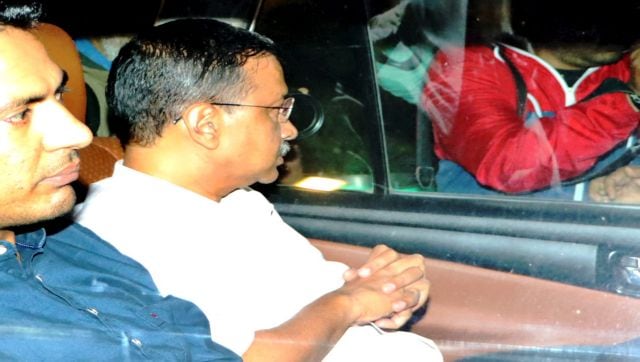The trouble for Delhi Chief Minister Arvind Kejriwal doesn’t end. On Wednesday (26 June), the Aam Aadmi Party (AAP) leader was arrested by the Central Bureau of Investigation (CBI) from inside Delhi’s Rouse Avenue Court. His arrest has been made in the alleged liquor policy case and the agency has now asked for five-day custody.
The move comes after the CBI examined Kejriwal in Delhi’s Tihar Jail last evening (25 June) and recorded his statement related to the excise policy case.
Shortly after his
arrest
, his wife,
Sunita Kejriwal
, alleged the whole system is trying to ensure that her husband does not come out of jail and that this is akin to “dictatorship” and “Emergency”. In a post on X in Hindi, Sunita said her husband got bail on June 20 in the excise policy-linked money laundering case but the Enforcement Directorate (ED) immediately got a stay. “The very next day, the CBI made him an accused. And today he was arrested. The whole system is trying to ensure that the man does not come out of jail. This is not law. This is dictatorship, this is emergency,” she said.
What is the case all about? How is it different from the Enforcement Directorate’s case against Kejriwal?
Delhi excise policy case
The arrest of Arvind Kejriwal by the CBI today (26 June) pertains to the Delhi Excise Policy of 2021. Kejriwal has already been arrested by the Enforcement Directorate (ED) and lodged at Tihar jail in connection with the money laundering case linked to the now-scrapped Delhi excise policy of 2021-22.
But what exactly was the
Delhi excise policy case
? In November 2021, the Delhi government, under Arvind Kejriwal’s leadership, introduced a new excise policy aimed at modernising alcohol sales in the city. However, this move received mixed reviews, with some concerned over the potential financial and public health implications.
Later, in July 2022, Delhi’s Chief Secretary Naresh Kumar reported violations in the policy to Lieutenant Governor (L-G) Vinai Kumar Saxena, who recommended a probe by the Central Bureau of Investigation (CBI). The report submitted alleged “financial losses to the exchequer” amounting to more than Rs 580 crore.
Following this, the excise policy was scrapped in July 2022.
It’s important to note here that though the CBI registered the case, the ED was the first to arrest Kejriwal.
Difference between ED and CBI case
There’s a difference between the ED and CBI cases in the excise policy matter. The CBI investigation pertains to the alleged irregularities in the formulation and execution of the policy. The central agency alleges that irregularities were committed in the Excise Policy, extending undue favours to the licensees, waiver/reduction in licence fee, the extension of L-1 licence without approval, among other issues.
The ED alleged that the scam was to give the wholesale liquor business to private entities and fix a 12 per cent margin, for a six per cent kickback, as per an Indian Express report. In its first prosecution complaint in November 2021, the ED said the policy was “formulated with deliberate loopholes” that “promoted cartel formations through the back door” to benefit AAP leaders.
In May this year, the ED’s supplementary chargesheet named Kejriwal and the AAP as accused in the case. The chargesheet had mentioned having evidence that money was sent to the AAP via “hawala” channels. It also claimed to have found chats between Kejriwal and “hawala” operators.
As Indian Express explains further, while the Enforcement Directorate (ED) case investigates the alleged money trail, the CBI case will have to prove corruption and bribe-taking by public servants.
Today’s arrest
CBI officials arrested Kejriwal from the Rouse Avenue courts complex, raising questions about the timing of his arrest.
“We could’ve done the exercise before the (Lok Sabha) elections but did not. It was only after he went back at the end of his interim bail, that we sought permission,” special public prosecutor DP Singh, appearing for CBI, told special judge Amitabh Rawat who had declined to interfere with the CBI questioning and arresting Kejriwal.
Moreover, Singh said that the CBI had received sanction to prosecute the chief minister under the Prevention of Corruption Act in April but it did not want to overreach the majesty of the Supreme Court which was considering Kejriwal’s release on interim bail at the time. “We showed restraint…. Every time we have tried to show our restraint. Now it is absolutely mandatory because now we want to conclude (the investigation) by July 3. There is an emergency for it. We will try to file the chargesheet thereafter,” Singh told the court.
The counsel representing Kejriwal opposed the CBI’s plea seeking his custody, terming the remand application “totally vague”. “This is a classic case of abuse of power,” the counsel said.
The AAP lashed out at the BJP and Prime Minister Narendra Modi after the arrest, saying the “dictator” crossed all limits of cruelty. The party stated that when “today when there was a possibility of CM Arvind Kejriwal getting bail, BJP panicked and got him arrested by CBI in fake case”.
With inputs from agencies
Link to article –
Why has the CBI arrested Arvind Kejriwal now? Is this different from the ED’s case?
